 Petzlover
Petzlover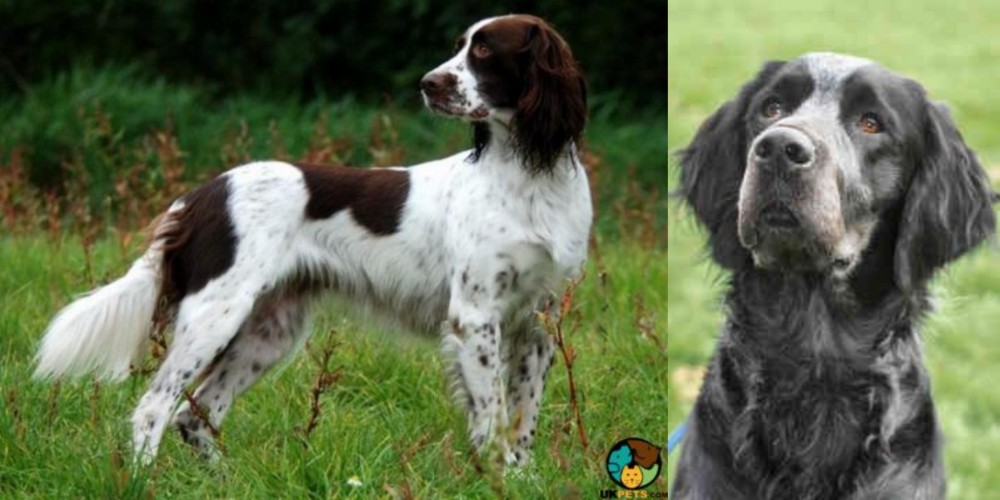 Both French Spaniel and Picardy Spaniel are originated from France. Both French Spaniel and Picardy Spaniel are having almost same height. Both French Spaniel and Picardy Spaniel are having almost same weight. Both French Spaniel and Picardy Spaniel has almost same life span. Both French Spaniel and Picardy Spaniel has almost same litter size. Both French Spaniel and Picardy Spaniel requires Moderate Maintenance.
Both French Spaniel and Picardy Spaniel are originated from France. Both French Spaniel and Picardy Spaniel are having almost same height. Both French Spaniel and Picardy Spaniel are having almost same weight. Both French Spaniel and Picardy Spaniel has almost same life span. Both French Spaniel and Picardy Spaniel has almost same litter size. Both French Spaniel and Picardy Spaniel requires Moderate Maintenance.
 Developed in France and then in Canada, the French Spaniel is a descendent of 14th century hunting dogs. Originally the breed was very popular with the French royalty and nobility at the Court of Versailles, in the Middle Ages. A French Spaniel named Babe was owned by Catherine I of Russia.
Developed in France and then in Canada, the French Spaniel is a descendent of 14th century hunting dogs. Originally the breed was very popular with the French royalty and nobility at the Court of Versailles, in the Middle Ages. A French Spaniel named Babe was owned by Catherine I of Russia.
Spaniels were mentioned in Gaston III of Foix-Beams’ The Master of the Game, or Livre de Chasse, in 14th Century France. Most believed that Spaniels had been developed during the 11th century Crusades. By 1650 the French Spaniel was differentiated from the King Charles Spaniel and determined to be its own type of spaniel.
In 1805, they were featured in the Sporting Magazine, hunting mallards. The French Spaniel was crossed with English Setters in the !850’s to develop the French Brittany (Spaniel). But by the end of the 19th century, hunting dogs from other countries were outpacing the French Spaniel so much that it was driven to the brink of extinction. Fortunately, a priest named Father Fournier saved the breed by taking all remaining Spaniels to his kennels at St. Hillarie and developing the lines we see in the breed today. This was followed by the founding of the French Spaniel Club in 1921. The various lines of the Spaniels included the French Spaniel of today, the Brittany of today, the Blue Picardy and the Picardy.
The French Spaniel however has been rare outside of its native country and Canada, where it was imported in the 1970’s to French speaking Quebec. Quebec Canadians fell in love with the breed for hunting grouse and woodcock. In order to ensure that the breed would be continued in line with its French standards, the Club de l’Epagneul Francais du Canada began in 1978. By 1985 the Canadian Kennel Club recognized the French Spaniel. Soon after they were recognized by the United Kennel Club, the Federation Cynoloqique Internationale, the UK Kennel Club and the North American Versatile Hunting Dog Association, but not the AKC (American Kennel Club). They are also registered with organizations such as the American Canine Association, the Dog Registry of America and the America’s Pet Registry. They have been included in the AKC Foundation Stock Service as the first step toward AKC recognition.
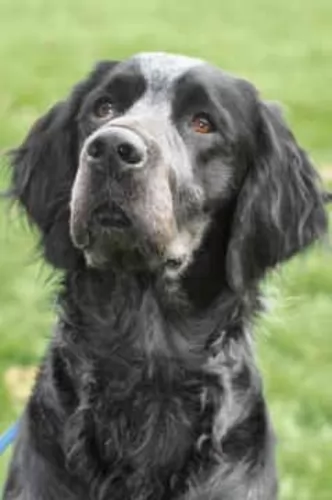 The Picardy Spaniel hails from France and has always been used as a gundog, having been crossed with different British hunting dogs.
The Picardy Spaniel hails from France and has always been used as a gundog, having been crossed with different British hunting dogs.
While this dog breed is related to the Blue Picardy Spaniel, the Picardy is the older of the two breeds. It has always been sought after by the French nobility for its hunting skills and the fact that its weather resistant coat allowed it to hunt in all kinds of weather conditions.
The dog’s popularity waned in the early 20th century. The UKC have recognized the Picardy Spaniel as a Gun Dog and the breed has also been accepted within the FCI as a Pointing dog group.
 The French Spaniel is a very tall dog and as such is one of the spaniel breeds two tallest. They are taller than the English Springer Spaniel, have a deep chest and a muscular build. Their legs are very strong, and they have a thick tail that is never docked. It is long, slightly curved and hangs low. He is an elegant dog with dark amber eyes, long feathery ears, and a nose the color of the coat. If the coat is brown the nose is brown. If the coat is black and white the nose is black. Most French Spaniels are white with brown or dark liver or white with black.
The French Spaniel is a very tall dog and as such is one of the spaniel breeds two tallest. They are taller than the English Springer Spaniel, have a deep chest and a muscular build. Their legs are very strong, and they have a thick tail that is never docked. It is long, slightly curved and hangs low. He is an elegant dog with dark amber eyes, long feathery ears, and a nose the color of the coat. If the coat is brown the nose is brown. If the coat is black and white the nose is black. Most French Spaniels are white with brown or dark liver or white with black.
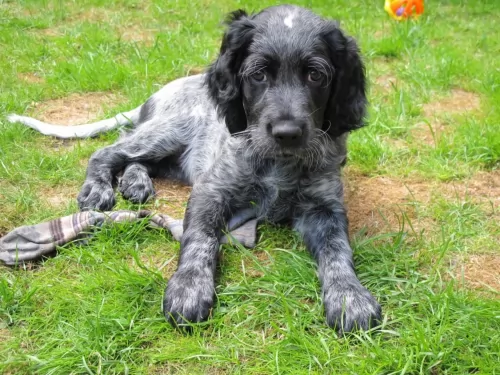 The Picardy Spaniel is larger than other spaniels. It is described as a medium sized dog, standing at 56 – 61cm in height and weighing between 20 and 25 kilograms. The body of the spaniel is squarely built and muscular body. The dog has long floppy ears and the coat which is shortish in areas except for feathering around the legs and belly can vary in colour from red to chestnut brown to sandy and chocolate. The tail is long and feathered.
The Picardy Spaniel is larger than other spaniels. It is described as a medium sized dog, standing at 56 – 61cm in height and weighing between 20 and 25 kilograms. The body of the spaniel is squarely built and muscular body. The dog has long floppy ears and the coat which is shortish in areas except for feathering around the legs and belly can vary in colour from red to chestnut brown to sandy and chocolate. The tail is long and feathered.
The Picardy Spaniel is a docile breed of dog and makes a great family pet, loving being playful with the children in the home and getting on well with other dogs. He is gentle but sociable and intelligent too and is easy to train and socialize.
Although he has been used as a hunting dog he can slot into life in the city or the countryside. He can be indoors or outdoors and still be happy, so long as his family members are close by.
He is an active dog though, and won’t be content to be sitting around for too long, loving nothing more than to be chasing a ball or going for a walk with you.
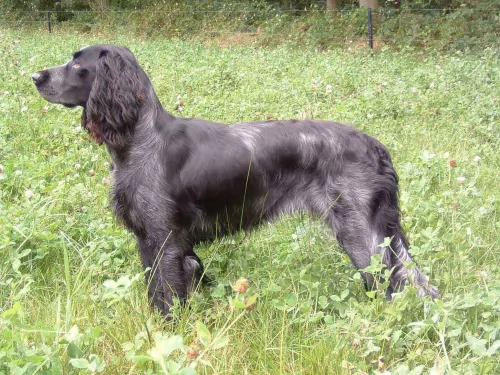 The Picardy Spaniel is a docile dog who forms strong bonds with his human family.
The Picardy Spaniel is a docile dog who forms strong bonds with his human family.
He doesn’t gel easily with strangers though, but socialization and training will at least make him well behaved among strangers.
A well-mannered Picardy Spaniel is a joy in the home, and this gentle dog is guaranteed to make you the most wonderfully loyal and loving pet and companion.
 The French Spaniel is a healthy breed that adapts well to all types of conditions, especially wet ones. There are some potentially serious health issues that the breed may be susceptible to:
The French Spaniel is a healthy breed that adapts well to all types of conditions, especially wet ones. There are some potentially serious health issues that the breed may be susceptible to:
This is a very serious inherited disorder. It is one of many Hereditary Sensory Autonomic Neuropathies (HSN) disorders. This is an agonizing infliction that causes the dogs to have no pain in certain extremities and therefore the ability to self-mutilate their feet, pads, claws and digits. They lick and bite their feet often amputating footpads, claws, and digits without feeling any pain. This leads to infection and most dogs end up being euthanized. The disorder shows up by 3-4 months of age.
Make sure the dog’s ears are cleaned regularly to remove wax and prevent infections.
This disease causes seizures but can be treated with medication.
Can cause lameness and arthritis.
 Without any major health issues, your Picardy can reach 14 years of age and possibly even older. A couple of common dog conditions to be on the watch for include:
Without any major health issues, your Picardy can reach 14 years of age and possibly even older. A couple of common dog conditions to be on the watch for include:
Your beautiful Picardy Spaniel has floppy ears and this opens up the tendency to suffer with ear infections. The inside of the ears are moist and hot and you as the dog owner can try to keep the inside of the ear clean and dry.
He is a dog that loves water too, and swimming encourages dampness. If you prefer not to work on the inside of the ears, dog groomers or your vet can clean the ears for you. An ear infection can be painful for your pet and it will require veterinary intervention.
These are dogs which can pick up weight quite easily. Dogs which are overweight are more prone to developing cancer, diabetes and heart disease, not to mention joint problems.
Other problems to look out for include cancer, bloat, dental disease and parasites.
 A high quality dry food made for puppies and if possible for Spaniels. Feed two to three times a day about one fourth of a cup each time
A high quality dry food made for puppies and if possible for Spaniels. Feed two to three times a day about one fourth of a cup each time
A high quality adult dry food made for Spaniels if possible. Feed twice a day about one half to three fourths of a cup at each meal.
Excellent vision, stamina and speed.
These dog love to run and play. They are smart and learn easily. They like to chase balls, swim, play hide and seek, Find It, and go hiking. They can excel at learning tricks, agility, rally and obedience trials.
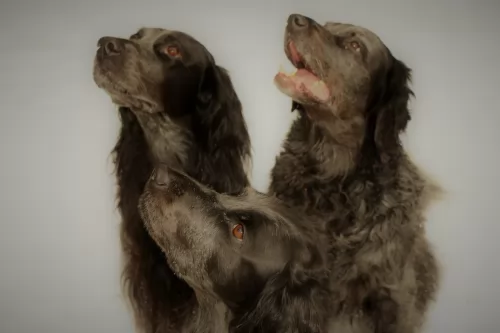 Your Picardy has a thick coat which sheds and the coat should be brushed at least twice a week to prevent matting. The ears of the Picardy Spaniel require special attention. Because they are long they will need to be cleaned and kept dry otherwise an ear infection can develop.
Your Picardy has a thick coat which sheds and the coat should be brushed at least twice a week to prevent matting. The ears of the Picardy Spaniel require special attention. Because they are long they will need to be cleaned and kept dry otherwise an ear infection can develop.
At the same time, check your pet over for ticks and fleas, check his eyes, keep the nails trimmed, and check inside his mouth for rotting teeth which can be the source of many health problems if left untreated.
If you have a puppy, you will need to provide 4 bowls of food in a 24 hour period. Check on the directions provided on the food packaging to see how much to feed your puppy.
By the time your Picardy is one year of age, he can move over to 2 bowls of food a day. Only the highest quality commercially manufactured food will be good enough for your dog. Food and its quality impacts the health and longevity of your pet.
Apart from dry kibble, try and provide some home-made food, keeping it as simple as possible. Dogs thrive on simple, consistent foods. Chopped up boiled chicken, brown rice, sweet potatoes, spinach and carrots added to the kibble now and then will thrill your pet. Occasionally you can also add in some raw meat.
Avoid feeding your dog things like coffee, chocolates, popcorn, nuts and onions as all these will just upset your dog's digestive system. The secret is to keep things simple and nutritious.
Make sure your pet always has access to fresh, cool water.